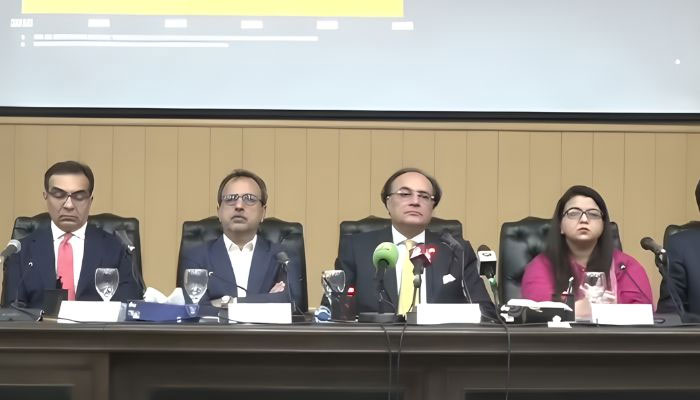ISLAMABAD: Finance Minister Muhammad Aurangzeb on Monday said that Pakistan’s economy was on a positive trajectory, stressing that the government’s primary goal was to achieve long-term, sustainable stability.
Speaking at a press conference alongside the government’s economic team, Aurangzeb said the government has made “notable progress” toward achieving macroeconomic stability, noting that the recently concluded staff-level agreement with the International Monetary Fund (IMF) reaffirms Pakistan’s ongoing economic recovery efforts.
He said that the government’s primary objective is to ensure sustainable economic stability through structural reforms. “Fundamental reforms in the tax system, energy sector, and other key areas are essential for long-term growth,” the minister said.
The finance minister said that pension reforms and right-sizing are also part of the fundamental reforms. He reiterated the government’s commitment to implementing its reform agenda to strengthen the economy and maintain fiscal discipline.
Aurangzeb added that three global rating agencies have confirmed Pakistan’s macroeconomic stability. He also expressed gratitude to the Gulf Cooperation Council, China, and the United States for helping Pakistan.
Federal Board of Revenue (FBR) Chairman Rashid Langrial said Pakistan’s tax-to-GDP ratio has increased by 1.5% for the first time. He said that the rate of filing individual income tax returns has also increased this year, with the number of taxpayers rising to 5.9 million.
He said that income tax filings saw an 18% jump compared to the previous year.
The FBR chairman said that the government aims to raise its tax-to-GDP ratio to 18% in the coming years, adding that comprehensive tax reforms cannot be achieved within a single year.
He said that there is no immediate need for the imposition of new taxes by the FBR, stressing instead the importance of improving tax compliance and broadening the tax base to strengthen revenue collection.
Energy Minister Awais Leghari said the government is organising the energy sector on modern lines and that wherever an opportunity arose, every possible effort was made to provide relief to the public.
He said in the past 18 months, the price of electricity was reduced by up to 10.5%, the EV rate was reduced from Rs71 to Rs39, and technical issues resolved in the energy sector achieved savings of billions of rupees.
He added that the task force on independent power producers (IPPs) has done notable work, circular debt was reduced by Rs700 billion in one year, and a loan agreement of Rs1,200 billion was concluded to reduce circular debt.
Leghari said the government will no longer purchase electricity, automated metering is being introduced with prepaid options for consumers, and the entire electricity system will be on automated metering in the next three years.
Adviser to the Prime Minister on Privatisation Muhammad Ali said the government is ensuring transparency in the privatisation process and enhancing the capacity of the Privatisation Commission. He said the pace of the privatisation process will accelerate in the coming period, noting that First Women Bank was sold for Rs5 billion.
He added that the UAE company that bought First Women Bank has now entered Pakistan. On the national airline, he said the first phase of the transaction could not be completed, and that there are now four consortiums for the privatisation of the national airline.
He said the groups coming forward for privatisation are those with vast experience, and that efforts are being made to complete the privatisation of the national airline before the end of the year.
The aim is for a business group to acquire the national airline that will make major investments in it, he added. He said financial experts are being engaged, the government is determined to achieve its targets related to privatisation, and the process of privatising DISCOs has begun with IESCO, LESCO, and FESCO.
